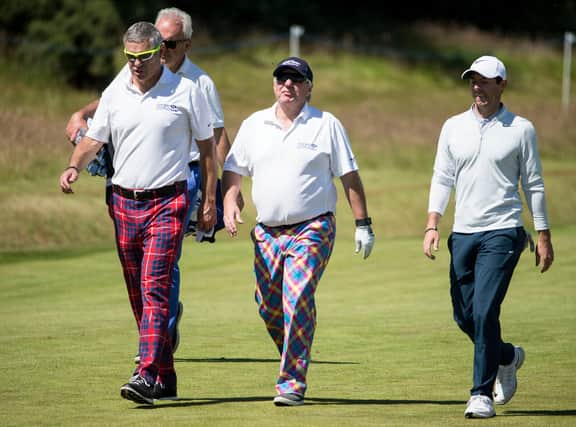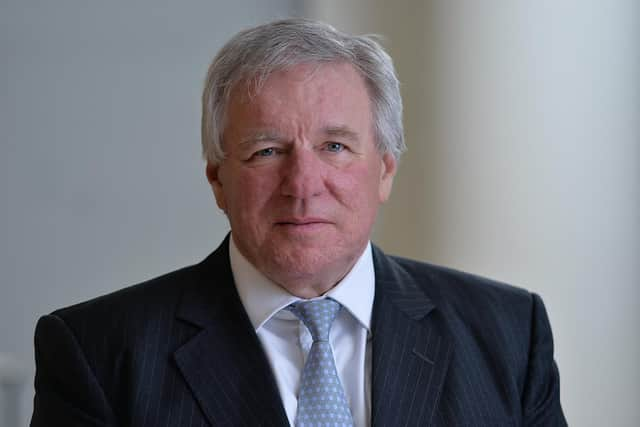National Conversation on Sport: ‘Sport can grow our communities and economies’


Gilbert stood down as chairman of Aberdeen Standard Investments last autumn after co-founding Aberdeen Asset Management in 1983 and building it into one of the world’s leading independent asset managers through a combination of organic growth and strategic acquisitions. He oversaw its merger with Standard Life PLC in 2017, creating the UK’s largest asset management firm, and the second biggest in Europe.
Prior to starting that journey he was a pupil at Robert Gordon’s College in the northern city, having been born in Malaysia before his family returned to Scotland. There he came under the tutelage of Charlie Raeburn, a PE teacher and enthusiastic sports coach who sought to instil in all of his pupils a love of sport. With Gilbert, he certainly succeeded, as he would play hockey, cricket, football and golf as a youngster, and keep sport a close part of both business and personal life from that point on.
Advertisement
Hide AdAdvertisement
Hide AdHis passion for sport is perhaps most obvious in the support Aberdeen Asset and ASI have given to a wide range of sports organisation and events, notably the Scottish Open men’s and women’s golf tournaments. But as important has been largely unseen support of sport and other projects helping to bring people together across a vast range of communities.


“Sport has a value that many people don’t see, and even many of those involved in sport don’t actually appreciate, to grow and strengthen communities and economies,” said Gilbert. “This is something recognised globally by the major companies.
“People will see the company flags or hospitality at major sport events, and that sponsorship helps sport and economies in many ways, but where sport is even more important is at the community level. We’re talking every kind of sport activity here - dancing, gymnastics, the tumble tots rugby fun for toddlers to walking sports for older people. Real social inclusion.
“That kind of activity is crucial to a community’s health but also to economic health, locally and nationally, and in Scotland right now we’re not making the most of that. Many businesses don’t realise where they can help, but also where they can benefit and grow as a result of investing in our communities. On the flip side, there is real potential for us and the new government now, after what we’ve been through, to use sport differently to help Scotland not only to recover from the pandemic but really grow as a dynamic, cohesive and healthy nation.”
Gilbert has returned the enthusiasm Raeburn showed him at school in Aberdeen by helping his former teacher to create the Observatory for Sport in Scotland, the first research think tank in Scotland dedicated to pulling together the research and evidence to help inform government and all involved in any form of sport to be more strategic and sustainable in their development of activity. He is now helping to engage business leaders across the world in supporting the OSS vision of shaping a society where activity is available to all ages and abilities, free or at low cost, in their community.
“When Charlie came to me with the idea I thought it was fantastic to be honest,” said Gilbert. “He explained how the most active countries in the world had moved in the past 20 years to address the challenges of inactivity, obesity and wider health and economic impacts. Key to that was scientific research and evidence to underpin policy changes. So, with the help of another of Charlie’s friends, Lord Campbell, we set about filling that void in Scotland.
“I have been delighted to see the OSS grow in the last five years. We have had great board trustees and our first director Marie McQuade did a terrific job before handing over to our CEO David Ferguson, the former sports journalist, who has taken it to another level. With Geoff Aberdein now the board chairman, former Scotland women’s coach Shelley Kerr on the board, some pretty experienced business people involved and over 30 researchers from across the world, it has grown into an exciting organisation.
“The focus for us now is to help the new Scottish Government and Sportscotland, but also health, education and economic partners, to create real cohesion to shape a brighter, healthier Scotland, and for me that also requires the support of Scotland’s business community.”
Advertisement
Hide AdAdvertisement
Hide AdThe OSS launched a manifesto ahead of the recent Scottish elections that called on the new Scottish Government to support a ‘National Conversation on Sport’s Role in Society’, and we have supported that at the Scotsman, as did all the political parties. SNP Minister for Education Fulton MacGregor insisted that the ‘National Conversation’ should shape the destination of new funding of £100m pledged by the SNP in their manifesto for sport in the new parliament term with a key focus on the significant drop-out of children from sport from age 11.
Gilbert insists that wider engagement in 2021-22 by the government and the OSS has the potential to significantly increase that sum through business support locally and nationally. This, he said, would put community activity onto a firmer footing, ease tensions across local authorities around community facility closures and relieve pressure on the government agency Sportscotland seeking, impossibly, to fill all the holes itself. Ultimately, this would reduce pressure on Scotland’s health and care system, and save billions of pounds spent on acute care in the mid to long-term.
The obvious question is perhaps ‘why’ or ‘how’ Scotland’s businesses would or could support sport when a large part of the sector is simply trying to work out how to survive as budgets tighten post-pandemic.
“But that is my point, exactly,” continues Gilbert. “Businesses need their communities now more than ever and communities need their businesses. What are businesses needing now and in the next few years? Strong, healthy and intelligent workforces, people fit enough to cope with the pressures we will face growing back out of the pandemic. The people key to that are in our communities, and are needed by every level of business from the local shop to big companies and the government itself.”
At the OSS conference in 2019, delegates heard from the then Chief Medical Officer, Catherine Calderwood. She spoke about better support for Scotland’s NHS staff, which employs around 150,000 people, to help them to have healthier lifestyles with time to enjoy sport and recreation, as the impact on Scotland’s population as a whole would be significant. Police Scotland and other public services have similar issues with mental health, stress and sickness at worrying levels.
Gilbert said: “We have been asking people to do more and more with less time off, less time to recover and less time to take part in sport and recreation.
“What’s more, we have turned sport into an activity only for those with money. We have lost a lot of the free sport we had as kids in local parks, and a lot of extra-curricular school sport in state schools particularly, and it’s moved into facilities. And there, reducing local authority budgets have squeezed facilities so hard that they are now inaccessible to large parts of our communities, despite the best efforts of those running the facilities and services.
“Scottish business can help to change that by being part of what we, at the OSS, are asking the new government to create - a multi-stakeholder strategic forum.”
Advertisement
Hide AdAdvertisement
Hide AdThe OSS is advocating a national forum that pulls key partners, including business, into a cohesive plan, but also local forums that brings all the key partners together in each region - from health to education, local authority to leisure trust and the third sector, and private business - to use sport activity more strategically and sustainably.
Gilbert adds: “Forums looking at sport have tended to exclude Scottish business - yes, we get pulled in when they are looking for a sponsor - but the private sector should be a key part of our recovery plan nationally and locally.
“And, to answer your question of ‘why’, the benefits for businesses who get involved with the OSS will be significant too, both in helping to strengthen the health and wellbeing of the Scottish workforce, but also in strengthening every community, its cohesion, the ability of people to find work, stay in work and contribute to society, and our connection to communities. Those are the key benefits we are looking at and we need government and businesses in Scotland to be all on the same page. There is much in the truism: ‘Scotland’s health is Scotland’s wealth’.”
Interview with Martin GilbertImproving the economy, driving fresh confidence in Scottish business and improving the nation’s health and wellbeing are clear priorities for the foreseeable future, and Gilbert insists that enabling all of the population to enjoy simple activity every week will go further to achieving those objectives than many realise.